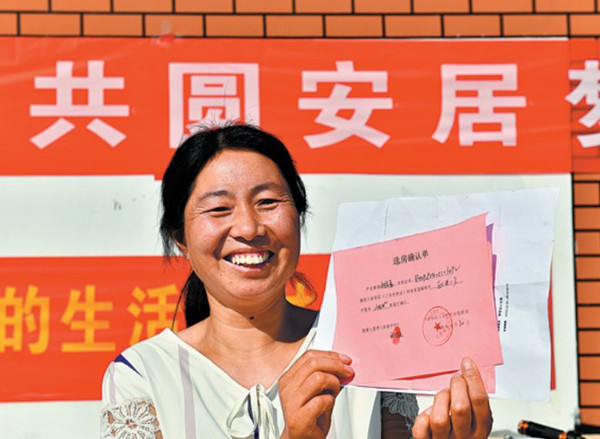Chinese home dreams come true

A rural resident shows her admission letter for house purchase in Heze, Shandong province. [Photo/Xinhua]
Housing reform
The growth of the national economy and the increase in household disposable income have helped drive the development of the real estate market and promoted reform in the housing system.
In 1998, China launched a housing reform that ended the welfare housing distribution system and allowed the housing market to operate commercially. Since then, the country's housing market has developed into the world's largest private sector real estate market by market scale, Brodie said.
The start of housing reform quickly put an end to the welfare housing system and made the housing market fully commoditized. Around 2000, the apartment Li and her parents lived in became their own after they bought it for about 20,000 yuan ($2,415 at the time).
The abandonment of the housing distribution system coincided with the issuing of a circular on further deepening reform of the urban housing system and accelerating housing construction, moves that Yuan Xiaochao, head of research in East China with Colliers, said were extremely forward-looking and strategically insightful.
"Basically, this established the real estate industry as a pillar of the national economy as it matters to the well-being of all people," Yuan said. "With continuous improvement of people's livelihoods, overall satisfaction with the Party's governance continues to rise, which in turn has helped the real estate sector to thrive."
Zhu Lei, senior director and head of research and consultancy with Knight Frank, said China has done a great job renovating obsolete housing, which involved the renovation of some 38.6 million premises and about 100 million households moving to new apartments.
The government has also taken farmers' residential conditions into account and published policies to step up the renovation of dangerous housing, Zhu said.
James Macdonald, senior director and head of research at Savills China, said there have been several pivotal moments in China's housing achievements over the years, including the introduction of land-use rights and the concept of commoditized housing in 1987 and 1988, the ending of enterprise-supplied housing in 1998 and 1999, giving local authorities the ability to convert rural land to urban land in 2004 and the implementation of the Property Law in 2007, as well as the introduction of pilot property taxes in Shanghai and Chongqing in 2011.
"More recently, there has been the push to support the development of residential leasing stock as well as innovations in joint-ownership properties and social housing, land auction policy adjustments, as well as shantytown redevelopment," Macdonald said.
Li Ling, president of CBRE China, said, "All these symbolic events were driven by the need to let the housing system better serve the nation's social conditions and economic development."
He said China is now in the process of establishing a multilevel residential supply and support system that includes commercial residential property, rental housing and government-subsidized affordable housing-further developing in the direction of ensuring people live in quality homes.
"This should be regarded as China's greatest achievement in the housing sector," Li said.
Copyright © The National Committee of the Chinese People's Political Consultative Conference.
All rights reserved. Presented by China Daily.
京ICP备08100501号-1

